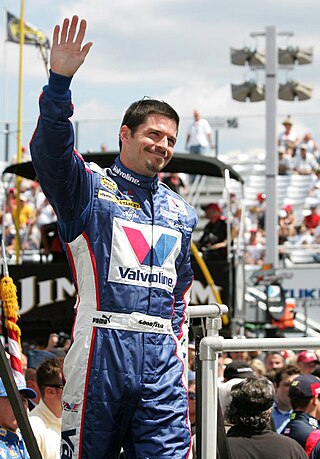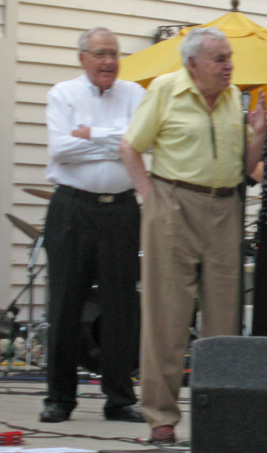Related Research Articles

Championship Auto Racing Teams (CART) was a sanctioning body for American open-wheel car racing that operated from 1979 to 2003. It sanctioned the PPG Indy Car World Series from 1979 until dissolving after the 2003 season.
Speed was an American sports-oriented cable and satellite television network that was owned by the Fox Sports Media Group division of 21st Century Fox. The network was dedicated to motorsports programming, including auto racing, as well as automotive-focused programs.

Robert August "Bob" Varsha is an American broadcast journalist who specializes in covering motorsports. He is best known for being the lap-by-lap commentator for Formula 1 and CART series races for ESPN, ABC Sports, and Speed Channel among others.

Leigh Diffey is an Australian-American auto racing commentator. His career began calling motorcycle races in his home country before moving to the United Kingdom to cover other forms of motorsport. Diffey then moved to the United States to join Speed Channel, while simultaneously working for Network Ten in Australia. Since 2013, he has served as a play-by-play announcer and studio host with NBC Sports in the United States.

Anthony James Allmendinger, nicknamed "The Dinger", is an American professional stock car racing driver. He competes full-time in the NASCAR Cup Series, driving the No. 16 Chevrolet Camaro ZL1 for Kaulig Racing and part-time in the NASCAR Xfinity Series, driving the No. 10 Chevrolet Camaro for Kaulig Racing.
Carl Arthur Haas was an American auto racing impresario. He co-owned the Newman/Haas/Lanigan Racing team in the Champ Car and IndyCar Series with Paul Newman and Mike Lanigan. He also owned Carl A. Haas Motorsports, which competed in the NASCAR Nationwide Series, as well as the Haas Lola Formula One team.

The American Speed Association (ASA) is a sanctioning body of motorsports in the United States formed in 1968. The Association was based in Pendleton, Indiana, and later in Daytona Beach, Florida. The ASA sanctioned asphalt and dirt tracks in their ASA Member Track program along with racing series in the United States and Canada.

Patrick Carpentier is a retired Canadian professional auto racing driver. In the Champ Car World Series and the IndyCar Series, he achieved five wins and 24 podiums, as well as two third place championship finishes in 2002 and 2004. The long-time Champ Car driver switched to the IndyCar Series in 2005, and moved on to Grand Am Road Racing in 2007. After a few NASCAR races in 2007, he moved full-time into the series in 2008. Since 2009, he has only had part-time drives, so became a contractor and renovator in Montreal, trading in real estate in Las Vegas, as well as being a color commentator for television coverage of various racing series. He last competed part-time in the NASCAR Sprint Cup Series, driving the No. 32 Ford Fusion for Go FAS Racing. Carpentier is now the president of a home construction firm in Quebec.

William Theodore Ribbs Jr. is a retired American race car driver, racing owner, and sport shooter known for being the first African-American man to have tested a Formula One car and to compete in the Indianapolis 500. Ribbs competed in many forms of auto racing, including the Trans-Am Series, IndyCar, Champ Car, IMSA, and the NASCAR Cup Series and Gander Outdoors Truck Series. After retiring, he became a sport shooter in the National Sporting Clays Association.
Motor Racing Network (MRN) is a U.S. radio network that syndicates broadcasts of auto racing events, particularly NASCAR. MRN was founded in 1970 by NASCAR founder Bill France, Sr. and broadcaster Ken Squier, and is a wholly owned subsidiary of NASCAR. Its first broadcast was the 1970 Daytona 500.

Christopher Constantine Economaki was an American motorsports commentator, pit road reporter, and journalist. Economaki was given the title "The Dean of American Motorsports Journalism." He was an inductee of several halls of fame, including the Motorsports Hall of Fame of America, National Sprint Car Hall of Fame & Museum, and Indianapolis Motor Speedway Hall of Fame.
Robert Francis Jenkins was an American television and radio sports announcer, primarily calling Indy car and NASCAR telecasts for ESPN/ABC and later Versus/NBCSN. Jenkins was the radio "Voice of the Indianapolis 500" on the IMS Radio Network from 1990 to 1998, then held the same role on ABC Sports television from 1999 to 2001.
Kenley Dean Squier is an American sportscaster and motorsports editor from Waterbury, Vermont. From 1979 to 1997, he served as the lap-by-lap commentator for NASCAR on CBS, and was also a lap-by-lap commentator for TBS from 1983-1999. Squier was the first announcer to give lap-by-lap commentary for the Daytona 500 in 1979. He coined the term "The Great American Race" for the Daytona 500 and helped introduce the Australian developed in-car camera for the 1982 running of the event. He lives in Stowe, Vermont.
NASCAR on CBS was the branding formerly used for broadcasts of NASCAR series races produced by CBS Sports, the sports division of the CBS television network in the United States from 1960 to 2000.

ESPN SpeedWorld is a former television series broadcast on ESPN from 1979–2006. The program that was based primarily based around NASCAR, CART, IMSA, Formula One, NHRA, and IHRA. The theme music is based on the piano interlude from "18th Avenue " by Cat Stevens.

TNN Motor Sports was a sports programming block on The Nashville Network from the network's launch in 1983 to 2000. TNN Motor Sports specialized in coverage of motorsports of various formats, most commonly auto racing. From 2000 to 2003, the network expanded its offerings to include alternative professional football and rebranded the block as TNN Sports. The block shut down in TNN's 2003 rebranding as Spike TV.
IndyCar Series on NBC is the blanket title used for telecasts of IndyCar Series racing produced by NBC Sports.

Richard "Rick" DeBruhl is an American auto racing and automobile auction commentator. He is currently the TV voice of the Barrett Jackson collector car auctions on the A&E Networks. DeBruhl previously worked in radio before becoming a television personality and journalist for the NBC affiliate in Phoenix, Arizona. His motorsports work began on ESPN in 1988 and lasted for nearly thirty years.
Until 2001, race tracks struck individual agreements with networks to broadcast races, but NASCAR wanted to capitalize on the growing popularity of the sport and announced in 1999 that television contracts would now be centralized; that is, instead of making agreements with individual tracks, networks would now negotiate directly with NASCAR for the rights to air a package of races.
References
- ↑ "Motorsport.com: News channel". www.motorsport.com. Archived from the original on 2009-06-25. Retrieved 2008-08-15.
- ↑ "NTV anchor resigns". Kearney Hub . July 13, 1988. p. 3A.